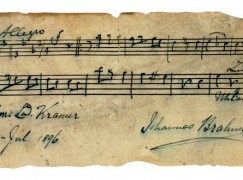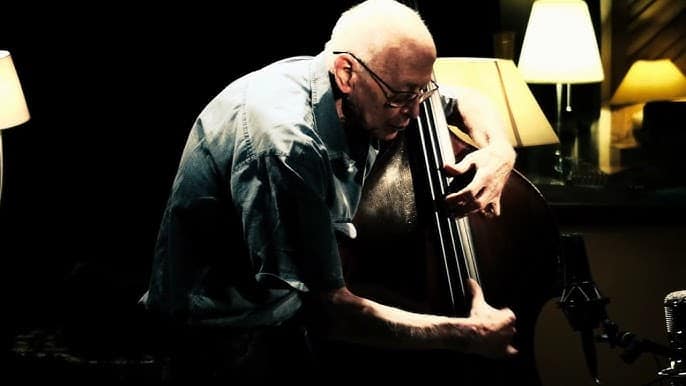Prices are tumbling for music memorabilia
mainThe Observer reports that Elvis mementos are fetching a tenth of their list price as collectors die off and few new ones are coming forward.
‘If you try to sell any Elvis record that could easily have sold for £15-£20 each in the 1980s today, you can hardly give them away,’ says Red, who runs an online Elvis vinyl store.
We are witnessing a similar tendency in the classical sector, where autographed concert programmes, scores and photos are shedding value and trade fairs are poorly attended.
Could it be that the modest collecting hobby is simply dying out?
Do share your experiences.






So the beer bottle (Heineken) that Klaus Tennstedt handed me in his dressing room won’t pay my retirement?
Depends…. Was Klaus Tennstedt’s lips touching the bottle ? Did he have a sip ?
I suspect the amount of material available online today vs. the 80s helps to depress prices as well the numerous fakes that are hard to distinguish from the real thing.
The concept of a “list price” for collectibles is odd to begin with. Who gets to make the list?
This phenomenon has been written about in other corners of the collectibles market as well.
The younger generation has a completely different view of “collecting.” Physical objects don’t have the same kind of allure. Our own children are in their twenties, and they have no interest in inheriting the family china or silver, much less my audio collection or autographed musical memorabilia.
And collecting on their own? They couldn’t be bothered. As one of our daughters told me, “I don’t want any of that stuff — and what goes and doesn’t go along with it.”
It.s the most worrying tendency in today’s young — their absolute lack of interest in things that happened a minute before they existed. They do not read older books (which get harder and harder to find), they do not listen to older music — and “older” apparently includes Elvis (whereas other rock and pop musicians, coming up after he was long gone, have told me of his being their first inspiration to try their hand at the guitar, at singing, at entertaining — even as their own roads took different routes when they found their own voices). Not to want the parents’ china or silver — that’s distressing, because it means not even their own personal history captures them.
They have no historical or other reference. Everything is now and fast, and they do not know any better as their teachers are cut from the same cloth. Left to them, nothing will last, or carry over — after millennia of continuous intellectual growth and expansion They think they have the whole world in those phones they bury their faces in all day, but their worlds are shrinking to the size of those screens.
Quite.
And what will this generation be remembered for?
Or is it already forgotten?
Where do people go to purchase these things regardless? Asking for a friend… wink wink.
I don’t know about the auction prices in general, but I’ve seen increases in the prices at eBay and elsewhere.
An example: 15 years ago a framed autograph of Sibelius was sold in Finland with 150 euros (1000 Finnish Marks in the old currency) .That was considered as a very high price to pay (“Imagine, a guy paid me 150 € for a Sibelius autograph!”). Now a quick look at eBay will show you Sibelius autographs and letters are at 2000-4000 €.
Also you can see an Enescu autograph at 1200 € – still only few years ago Enescu autographs you could get under 100 €…
Also Ravel letters and autographs are between 1200-2000 €. But I remember 10 years ago seeing one sold under 300 € (I lost the bid).
I would say that when it comes to classical music the prices seem pretty high!
Norman:
You are not correct. While opera and ballet autographs are dying the death of 1000 slices, Composers, Conductors and Instrumentalists are holding value, if not increasing in value in many cases. In fact Gilbert Kaplan’s Mahler 2nd working MS reached a World record for a Mahler ms at Sotheby’s last year. The annual Sotheby’s sales also are doing quite well. The dilemma with E-Bay is many of the autographs I see there are forgeries, or insignificant. I do buy differently today than I bought 20 years ago when I would purchase primarily for stock. (You never know.) Today I buy with specific customers in mind who I know want certain things for their collections, or archives. Buying large collections just to hoover up material is also a thing of the past. When someone presents a collection to me and it has a lot of riff-raff that will sit on my shelves for eternity, I’m not interested if they will not let me select the items which are of interest to me. As for clients, yes, you are correct, the opera and ballet autograph collectors, just like the large collectors of movie star photographs of 20 and more years ago who have died have not been replaced. Not so in other fields of music. By the way, it is also a trendy business, certain things are “hot” at certain times, while others who were hot before cool down. However, I find it is cyclical and collectors do come back to the composers and musicians which have cooled down. Another quick word on E-Bay, caveat emptor unless you know your dealer and their experience. Someone selling single autographs, or a collection they find in Aunt Tillies attic also typically have no idea what is right or wrong when they list on E-Bay, so buy their with caution. In reply to Joel, one of the reasons prices have risen on E-Bay is the advent of the E-Bay store, where dealers list their stock at their prices. At least one dealer who used to list classical music autographs for $9.99 for everything retired, so that’s not as prevalent as it used to be.
Anyhow, my food for thought as a professional in the business for 20 years and nearly 30 years of collecting before I opened my business.
Bill Ecker
Harmonie Autographs and Music, Inc.
New York, NY
I’m happy to second everything that Bill Ecker has said. Schubertiade Music & Arts has had by far the strongest year of sales since we opened for business in 2006. Of course there have been changes in the market, as Bill rightly points out. But it has been more than ever my experience that serious collectors – many of whom, I should add, are age 35 – 50 – are enthusiastically seeking great material and happy to pay what it is worth. That includes our serious collectors of Brahms and Schumann, of violinist and pianist autographs, of jazz, of major dance material and even the higher bracket of opera material which in my experience has not much been touched by eBay. Just this morning, I met by appointment a 30-something buying his first piece of jazz memorabilia! I don’t know about cheap unsigned Elvis records, but I know of a number of excellent signed Elvis photographs that have sold for close to $10k each in the past 2 years, through dealers and auction houses (which would have sold for $1k in the 80s). As with the art market, serious collectors frequently buy directly and value their privacy, so some of this is harder to track. I wonder which trade fairs are under attended? Certainly the major book fairs sponsored by ABAA and ILAB at which we and other music dealers exhibit (in Boston, CA, NYC and Paris, for example) have all had banner years in terms of attendance and sales this March at the Armory show (widely considered the best book fair in the world), were widely reported to have been among the strongest in years.
Gabe Boyers,
Schubertiade Music & Arts
Boston